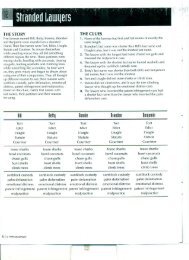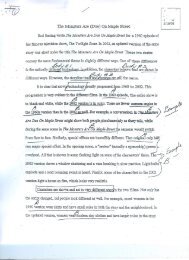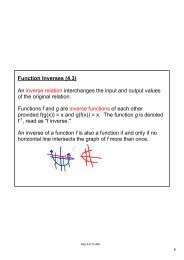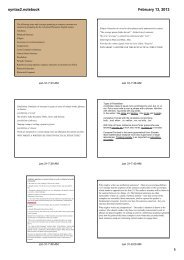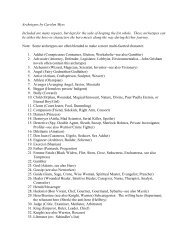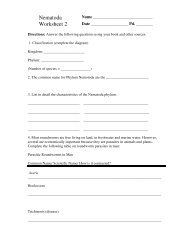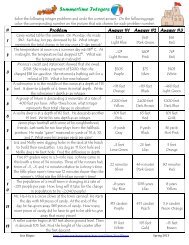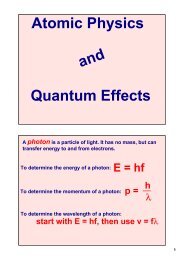Rosencrantz and Guildenstern Are Dead - Cherokee County Schools
Rosencrantz and Guildenstern Are Dead - Cherokee County Schools
Rosencrantz and Guildenstern Are Dead - Cherokee County Schools
Create successful ePaper yourself
Turn your PDF publications into a flip-book with our unique Google optimized e-Paper software.
sealed. They will die at the end, even though they shift back <strong>and</strong> forth from the Shakespearean to the<br />
Stoppardian story. What was special about this day is that it set in motion the events that would lead to their<br />
deaths.<br />
Fate is something that has already been decided, something humans have no control over, something that will<br />
happen whatever human beings do, <strong>and</strong> the literary fatality that comes from entering a world where events are<br />
already decided gives Stoppard the metaphor he needs for human fate. Though they resist accepting the fact,<br />
human beings are doomed to die as soon as they enter the world.<br />
When the tragedians first arrive in Stoppard's story, <strong>Guildenstern</strong> says "it was chance, then ... [that] you found<br />
us," <strong>and</strong> the Player says, "or fate." Subsequent references to "getting caught up in the action" of the<br />
Shakespeare play are frequent, as are references to not having any "control." And when the Player says in<br />
their dress rehearsal for The Murder of Gonzago that "everyone who is marked for death dies," <strong>Guildenstern</strong><br />
asks, "Who decides?" <strong>and</strong> the Player responds, "Decides? It is written.''<br />
Art <strong>and</strong> Experience<br />
Stoppard elaborates on the theme of fate by exploring the relationship between art <strong>and</strong> experience.<br />
Throughout the play, he uses the tragedians <strong>and</strong> their spokesperson, the Player, to emphasize that art can<br />
create an illusion that is often more real <strong>and</strong> convincing than the experience of ordinary life.<br />
The tragedians specialize in portraying death on stage, but <strong>Guildenstern</strong> argues that their version of death is<br />
not "real." The Player responds by saying that the fictional representation of death is the only version that<br />
human beings will believe. He recalls the time he arranged for one of his actors condemned to be hanged to<br />
meet his execution on stage. However, to his surprise, the audience jeered <strong>and</strong> threw peanuts at this "real<br />
death'' <strong>and</strong> the actor couldn't accept his fate calmly, crying the whole time, "right out of character.''<br />
Sigmund Freud asserted that human beings are psychologically incapable of seeing themselves as dead. When<br />
we come close to dying in our dreams we wake up or alter the dream so we become spectators ourselves, <strong>and</strong><br />
as soon as we exist as spectators we have not in fact died. In art, however, we can experience death<br />
vicariously <strong>and</strong> safely, testing our reactions to it in a way that paradoxically rehearses us for our own death<br />
while further distancing us from the reality of it. Playing the role of spectators is perhaps as close as humans<br />
can ever get to accepting the reality of their human mortality.<br />
This assertion is demonstrated most effectively in Act III, when the frustrated <strong>Guildenstern</strong> attacks the Player<br />
<strong>and</strong> seems to stab him fatally in the neck with a dagger. Like <strong>Rosencrantz</strong> <strong>and</strong> <strong>Guildenstern</strong>, audience<br />
members initially unaware of the retractable blade in the stage dagger will experience a moment of shock<br />
when it appears that a real death has taken place on stage. But almost immediately we remember that we are at<br />
a play <strong>and</strong> that this death cannot possibly be real. When the Player comes to his feet to the applause of his<br />
fellow tragedians, the audience laughs in relief, as does <strong>Rosencrantz</strong>, who applauds <strong>and</strong> calls for an encore.<br />
Death<br />
The theme of humans denying their own mortality also helps to explain a number of problematic points in the<br />
play. When, for example, <strong>Rosencrantz</strong> <strong>and</strong> <strong>Guildenstern</strong> discover that the letter from Claudius orders Hamlet's<br />
death, the generally sympathetic <strong>and</strong> pleasant pair distance themselves from the fact <strong>and</strong> justify their<br />
non-involvement. As disagreeable <strong>and</strong> unheroic as this behavior might be, it is in keeping with Stoppard's<br />
theme. <strong>Guildenstern</strong> justifies his non-involvement by feigning acceptance of "the designs of fate," <strong>and</strong><br />
<strong>Rosencrantz</strong>'s denial of responsibility is capped with a phrase that adumbrates the end of the play— "If we<br />
stopped breathing we'd vanish." Even more problematical, perhaps, is their behavior after discovering the<br />
revised letter that orders their own deaths. Shakespeare's pair were probably ignorant of the letter's contents<br />
<strong>and</strong> surprised by their executions. <strong>Rosencrantz</strong> <strong>and</strong> <strong>Guildenstern</strong> realize they are delivering their own death<br />
warrants <strong>and</strong> do nothing to avoid it. But quite in character, <strong>Rosencrantz</strong> simply avoids thinking about it—"All<br />
Themes 5





